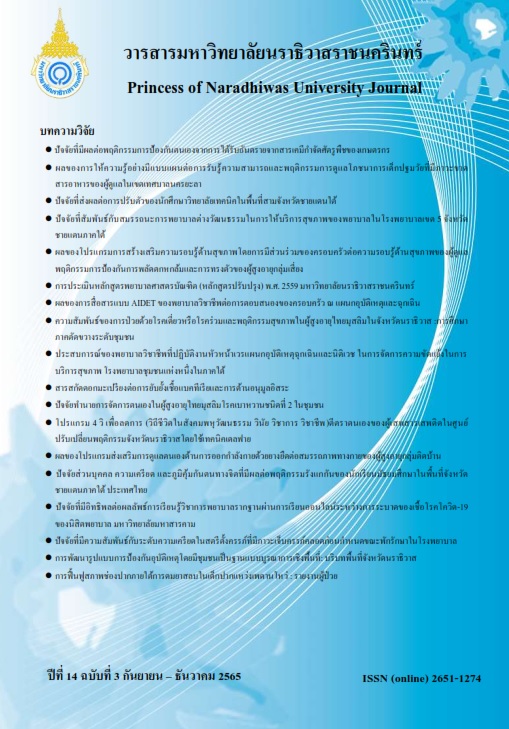The Program of 4 Categories (Life in Multicultural Society, Discipline, Knowledge Training, and Profession Training) to Reduce Self-stigma of Drug Addicts in the Behavior Modification Center, Narathiwat Province by Using the Delphi Technique
Keywords:
Delphi technique, Self-stigma, Drug addicts, The behavior modification center of drug addictsAbstract
The objective of this descriptive research by using the Delphi Technique was to develop the program of 4 categories (Life in multicultural society, discipline, knowledge training, and profession training) in order to reduce self-stigma of drug addicts in the behavior modification center, Narathiwat province. The sample consisted of 15 participants which could be divided into 2 groups; professional nurses and experienced public health academics in drug treatment at behavior modification centers. They were selected by using snowball technique. The instruments used were; questionnaires that asked about general information and 5-point rating scale. The data was collected 3 times and analyzed by median and interquartile range.
The results revealed that the program of 4 categories, (Life in multicultural society, discipline, knowledge training, and profession training) in order to reduce self-stigma of drug addicts in the behavior modification center, Narathiwat province, obtained from the consensus of experts has the median value between 4.00-5.00 and the interquartile range of 0.00-1.00. They were included with; (1) 6 sub-activities from life in multicultural society, (2) 3 sub-activities from discipline category, (3) 5 modules from knowledge training as follows: 1) Mind reviewing to reduce self-stigma 2) Self-learning and problem-solving 3) Motivation to in enhancing self-worth 4) Religion leading life to goal achievement and 5) The power of self-improvement, which were all included with 19 sub-activities, and (4) 2 sub-activities from profession training. There were 30 sub-activities in total. From this research findings, the staff involved in drug addiction treatment in behavior modification centers, Narathiwat province can utilize the program in the treatment of drug users in order to reduce self-stigma for the better quality of life.
References
Chailaka, P., Thepthien, B., & Chucharoen, P. (2017). Depression, Automatic Though, Attitude Disorder and Cognitive Distortion of Metamphetamine Addicts Age 18-24 Years. KKU Journal for Public Health Research, 10(1), 73-85.
Dobbins, T.R. (1999). Clinical experiences for agricultural teacher education programs in NorthCarolina, South Carolina, and Virginia. PublishedDissertation, Virginia Polytechnic Institute and State University, Blacksburg, VA, form https://vtechworks.lib.vt.edu/bitstream /handle/10919/ 28892/DOBBINS1.PDF?sequence=3&isAllowed=y
Hawangchu, D., Chamratrithirong, A., & Phuengsamran, D. (2017). Stigmatization Phenomena among People Who Use Drugs: A Case Study from Community-based MMT Clinics. Thai Journal of Public Health, 47(3), 276-288.
Huaisai, T., Surinchompu, K., & Pongtrippat W. (2021). Negative Automatic Thought and Suicidal Risk of Psychiatric Patients. Journal of Sakon Nakhon Hospital, 24(2), 49-57.
Jehsmajeh, S., Thammakun, T., & Chankong, W. (2021). Factors Affecting Non-Relapse Drug Addiction of Rehabilitative Patients in Mueang District, Yala Province. Al-Hikmah Journal FTU, 11(22), 203-218.
Kansan, N., Sukontapirom Na Pattalung, A., & Wiriyasakul, A. (2021). Islamic based therapy for substance Addicts. Journal of Multidisciplinary in Humanities and Social Sciences, 4(1), 256-268.
Kleebbua, S., Yongyuan, B. & Seree, P. (2018). Relationship between the Five-Factor Model of Personality and Self-Control among Young People Who Committed Drugs Related Crimes. Academic Services Journal Prince of Songkla University, 30(1), 189-199.
Kurusatra, A. (2017). Behavior changes center standard for drug addicts. Samut Sakhon.pp.16-180) Office of Born to Bee Publishing company.
Meesil, M. (2016). Delphi Technique: Avoidance of misconception. Veridian E-Journal, Silpakorn University, 9(1), 1256-1267.
Pongissawaranun, N. (2021). Report on drug prevention and suppression performance 2021. (pp,56-57). Bankok :Office of the Narcotics Control Board. (in Thai).
Samputtanon, J., & Yunibhand, J. (2018). Factors Related to Self-Efficacy for Amphetamine Relapse Prevention among Male Adolescents, Government Drug Abuse Treatment Centers. Journal of Nursing and Health Care, 36(1), 6-14.
Santos da Silveira, P., Andrade de Tostes, J.G., Wan, H.T., Ronzani, T.M., & Corrigan, P.W. (2018). The stigmatization of drug use as mechanism of legitimation of exclusion. In Drugs and Social Context (pp. 15-25). Springer, Cham.
Soongjit, P., Phratumkaew, S., & Sangrung, P. (2019) An application of Buddhist Dharma to promote treatment and reduce the problem for the repeat offenders of the youths addicted drug: A case study of WatNoonsoongwanaram in Khunhan district Sisaket province. Journal of Graduate Saket Review, 4(2), 47-62.
Suktrakul, S. & Uthis, P. (2018). The Effects of Self-stigma Program in Drugs Used Persons. Journal of The Royal Thai Army Nurses, 19(Supplement), 364-372.
Wongpanarak, N. (2018). Nursing care drug addict. (pp.16-17) Maha Sarakham.: Office Kakayia. (in Thai).
Additional Files
Published
How to Cite
Issue
Section
License
Copyright (c) 2022 Princess of Naradhiwas University Journal

This work is licensed under a Creative Commons Attribution-NonCommercial-NoDerivatives 4.0 International License.




